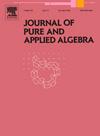有限生成模块的结构与未混合度
IF 0.8
2区 数学
Q2 MATHEMATICS
引用次数: 0
摘要
设(R,m)为Cohen-Macaulay局部环的同态像,m为有限生成的R模。我们利用局部上同调的分裂来揭示非cohen - macaulay模的结构。也就是说,我们证明了每一个有限生成的r模M都与一个不变模序列相关联。该模块序列用Cohen-Macaulay性质表示M的偏差。我们的结果推广了任意有限生成r模的Cohen-Macaulayness非混合定理。作为一种应用,我们在Vasconcelos意义上构造了一个新的扩展度。本文章由计算机程序翻译,如有差异,请以英文原文为准。
On the structure of finitely generated modules and the unmixed degrees
Let be the homomorphic image of a Cohen-Macaulay local ring and M a finitely generated R-module. We use the splitting of local cohomology to shed a new light on the structure of non-Cohen-Macaulay modules. Namely, we show that every finitely generated R-module M is associated to a sequence of invariant modules. This module sequence expresses the deviation of M with the Cohen-Macaulay property. Our result generalizes the unmixed theorem of Cohen-Macaulayness for any finitely generated R-module. As an application we construct a new extended degree in the sense of Vasconcelos.
求助全文
通过发布文献求助,成功后即可免费获取论文全文。
去求助
来源期刊
CiteScore
1.70
自引率
12.50%
发文量
225
审稿时长
17 days
期刊介绍:
The Journal of Pure and Applied Algebra concentrates on that part of algebra likely to be of general mathematical interest: algebraic results with immediate applications, and the development of algebraic theories of sufficiently general relevance to allow for future applications.

 求助内容:
求助内容: 应助结果提醒方式:
应助结果提醒方式:


